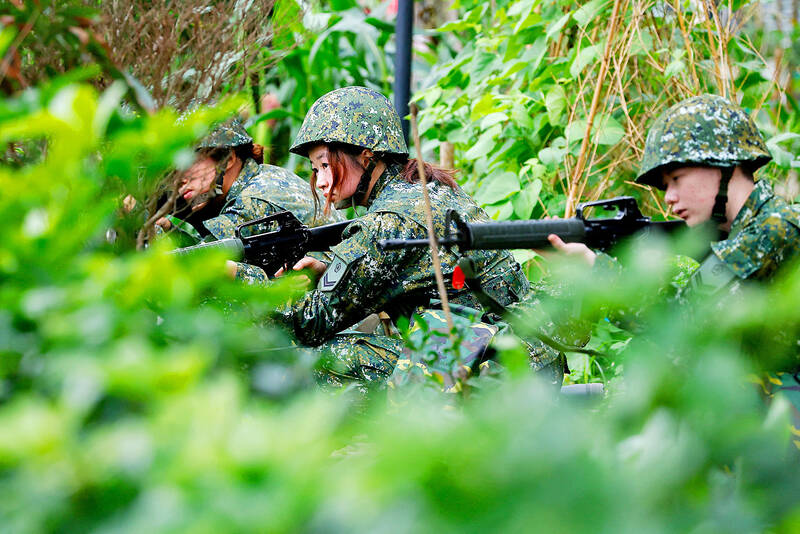While a total of 120,000 reservists are expected to be called up for alternative reserve drills this year, compared with the 6,505 drilled last year, the number has been revised to 58,000 due to a postponed training date, Deputy Minster of the Interior Ma Shih-yuan (馬士元) said.
In principle, the ministry still aims to call up 120,000 reservists for alternative reserve drills next year, he said, but the actual number would not be decided later until after this year’s evaluation.
The increase follows a Legislative Yuan request that the Ministry of the Interior address low recruitment rates, which it made while reviewing annual budgets for the current fiscal year.

Photo: Ann Wang, Reuters
In 2021, 1,565, or 0.86 percent, of the 181,904 male reservists who had retired from military service within the previous eight years were called up for training.
That figure rose to 2,958 the following year and 6,505 last year, a recent report from the department showed.
Following the legislature’s proposal earlier this year, the number of reservists to be called up for training is to soar to 120,000, according to the ministry's latest report to the legislature.
To facilitate the increase, the ministry said it would consider amending the Measures for Recruitment of Retired Male Reservists (替代役役男服役期滿後召集服勤實施辦法) to address issues such as the length and frequency of reservist training sessions.
The regulations define penalties for those who fail to show up for training without reason, and the amendments would seek to balance the rights and obligations of male reservists based on those penalties, it said.
Institute for National Defense and Security Research fellow Su Tzu-yun (蘇紫雲) yesterday said that civil defense would be an important component of Taiwan’s overall defense strategy.
During wartime, reservists could serve critical roles in many areas of civil defense, including firefighting, policing and information technology, Su said.
For example, as Taiwan Semiconductor Manufacturing Co (台積電) and the Chungshan Institute of Science and Technology are strategically important, reservists could help the institutions meet their labor needs during wartime, he said.
“Those called up for training could be proficient in different specialties. By training them in crisis awareness, we can strengthen civil defense and the resilience of society as a whole,” he said.
Kuma Academy chief executive officer Ho Cheng-hui (何澄輝) echoed Su’s sentiments, adding that Taiwan needs a sound civil defense system.
“Taiwan contends with numerous natural disasters, as well as military threats from China. If a serious situation occurs, local governments might not be able to deal with it,” Ho said. “By expanding the number of people called into alternative service, a sound civil defense system can be established to address such emergencies.”
As China would seek to infiltrate Taiwan during a war, civil defense measures should also include training on how to recognize and combat espionage and collaboration with China, he said.
This article has been updated since it was first posted.

AIR SUPPORT: The Ministry of National Defense thanked the US for the delivery, adding that it was an indicator of the White House’s commitment to the Taiwan Relations Act Deputy Minister of National Defense Po Horng-huei (柏鴻輝) and Representative to the US Alexander Yui on Friday attended a delivery ceremony for the first of Taiwan’s long-awaited 66 F-16C/D Block 70 jets at a Lockheed Martin Corp factory in Greenville, South Carolina. “We are so proud to be the global home of the F-16 and to support Taiwan’s air defense capabilities,” US Representative William Timmons wrote on X, alongside a photograph of Taiwanese and US officials at the event. The F-16C/D Block 70 jets Taiwan ordered have the same capabilities as aircraft that had been upgraded to F-16Vs. The batch of Lockheed Martin

GRIDLOCK: The National Fire Agency’s Special Search and Rescue team is on standby to travel to the countries to help out with the rescue effort A powerful earthquake rocked Myanmar and neighboring Thailand yesterday, killing at least three people in Bangkok and burying dozens when a high-rise building under construction collapsed. Footage shared on social media from Myanmar’s second-largest city showed widespread destruction, raising fears that many were trapped under the rubble or killed. The magnitude 7.7 earthquake, with an epicenter near Mandalay in Myanmar, struck at midday and was followed by a strong magnitude 6.4 aftershock. The extent of death, injury and destruction — especially in Myanmar, which is embroiled in a civil war and where information is tightly controlled at the best of times —

China's military today said it began joint army, navy and rocket force exercises around Taiwan to "serve as a stern warning and powerful deterrent against Taiwanese independence," calling President William Lai (賴清德) a "parasite." The exercises come after Lai called Beijing a "foreign hostile force" last month. More than 10 Chinese military ships approached close to Taiwan's 24 nautical mile (44.4km) contiguous zone this morning and Taiwan sent its own warships to respond, two senior Taiwanese officials said. Taiwan has not yet detected any live fire by the Chinese military so far, one of the officials said. The drills took place after US Secretary

THUGGISH BEHAVIOR: Encouraging people to report independence supporters is another intimidation tactic that threatens cross-strait peace, the state department said China setting up an online system for reporting “Taiwanese independence” advocates is an “irresponsible and reprehensible” act, a US government spokesperson said on Friday. “China’s call for private individuals to report on alleged ‘persecution or suppression’ by supposed ‘Taiwan independence henchmen and accomplices’ is irresponsible and reprehensible,” an unnamed US Department of State spokesperson told the Central News Agency in an e-mail. The move is part of Beijing’s “intimidation campaign” against Taiwan and its supporters, and is “threatening free speech around the world, destabilizing the Indo-Pacific region, and deliberately eroding the cross-strait status quo,” the spokesperson said. The Chinese Communist Party’s “threats